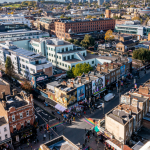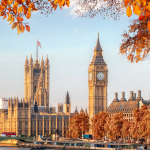With the recent opening of Battersea Power Station, alongside a raft of new development which has transformed the borough over recent years, Wandsworth has firmly established its credentials as a vibrant component of central London’s commercial offer.
But the fact the borough’s new administration did not attend the launch itself was portrayed by some commentators as a snub, something Cllr Hogg flatly rejects: “We love the Power Station, I was up there last week and it looks absolutely fantastic, it’s stunning.” Whilst he does not agree with all the planning decisions around the project, particularly in relation to affordable housing, the reason for not participating in the launch was to do with due process given there are number of active planning matters on the vast site still to be resolved, as well as Labour’s stance on hospitality.
On which he advises potential investors: “If you want to do business in Wandsworth, don’t give us FA Cup Final tickets and don’t take us out to dinner. Come in, we’ll sit down, have a cup of tea and talk about your scheme. Officers will be present, though public affairs professionals will not be. We will deal with you directly. You will get fair and swift decisions.”
Cllr Hogg may be one of London’s newest borough Leaders, but he’s no political novice. As a Labour campaigner of 20 years standing and an elected opposition councillor for 12, he is well-versed in local politics and in the affairs of his home borough. Hogg led Labour to win Wandsworth for the first time in 44 years and is clearly proud of the achievement:
“There were only nine Labour Councillors when I was first elected and now there’s 35 of us” giving the Labour group a comfortable majority. Not to mention – as he does, with relish – that Labour now also controls all three of Wandsworth’s parliamentary constituencies of Battersea, Putney and Tooting. Even the Mayor of London, Sadiq Khan, is a “local boy and close ally”.
Back on Battersea Power Station, he is especially pleased to see Apple moving into offices on the site. The Council is already collaborating with the tech giant to secure devices for local schools and to encourage children to aim for opportunities offered by the “new ecosystem of tech companies that’s going to grow up around this area”.
He adds: “We love the investment and jobs it brings, as well as the sheer enjoyment it brings to the borough.” Its success is undisputed, enabling the delivery of a new Tube station at the site, which is expected to see 10 million trips per annum by 2024-25 according to TfL.
But Hogg does not disguise his and colleagues’ frustration at the lack of affordable housing on the site, which he laments was “down from 15% to 9% on a £9bn scheme”.
“We want a fairer, more compassionate, more sustainable council….we welcome growth and investment. We want to create beautiful places and we remain very much open for business, but we also want to reset the relationship.”
That means “no hospitality and no donations,” “a new level of transparency” and higher expectations that development will “leave a lasting legacy.”
Key to that lasting legacy is “the delivery of genuinely affordable housing for local people” and Hogg is clear that the borough will, going forward, expect to see 50% affordable housing offered by new residential schemes – “and we want of majority of that to be social housing,” which, he stresses, “we see as the only genuinely affordable housing, guaranteed for local people and their children”.
The borough’s high streets, and major commercial districts like Nine Elms, he says “face the same post covid challenges as everyone else”. But Hogg is confident in Wandsworth’s draws to new businesses as working patterns change, with greater opportunities outside the “mass central London model”. Companies, he said, are looking at a mix of factors, including transport links, access to skilled labour and proximity to hospitality – and Wandsworth offers all those things “whether in Nine Elms, or in Wandsworth Town Centre, Tooting, and Putney.”
The borough is hard at work to ensure that it continues to offer that mix of factors, providing residents and businesses with a comfortable “15-minute city” experience. It is continuing “strong capital investment” in its public realm and town centres through a £5m High Streets Funds and projects like the one to create a one-way system to make Wandsworth Town Centre “much more liveable” for residents and businesses alike.
“We’re going to keep investing in those town centres so they’re a great place to go out but also to set up a business.” And while the financial environment is difficult, he is pleased to report that the borough’s Community Infrastructure Levy (CIL) income “remains strong” enabling the borough to “unlock major projects.”
He wants that continued investment to deliver affordable housing, citing the fact that 3,000 children in the borough are currently living in temporary accommodation because their family is homeless. He adds: ”Young renters here spend half of their take-home pay on rent. And it’s too far out of reach, for far too many people, to buy a home.”
Aside from housing, he says, “we will be absolutely clear about the community benefits that we want.” About “the absolute highest standards of environmental sustainability that we want to see” as well as “our expectation that you pay the London Living Wage and welcome trade unions within your workplace.”
He stresses that the council itself is pulling out all the stops to meet local demand for social housing. Under Labour, it is committing to building 1,000 social homes on its own land as well as improving the terms for its own tenants and leaseholders. Hogg highlighted work progressing the Winstanley Estate’s regeneration in collaboration with Taylor Wimpey and also “taking a different approach” in regards to the Alton Estate, where the council has paused the scheme to reconsult with residents on “a better way of doing it.” Wandsworth is also taking “swift and robust action” to regulate the private rental sector, with a new landlord licensing scheme, to help secure “a better deal for renters.”
So what does political change mean in Wandsworth, which was one of three Tory-led London boroughs to be flipped by Labour at the 2022 local elections: “We’re trying to switch from being a ‘steady as you go’ Tory council to being a progressive and ambitious Labour one,” Hogg says, seemingly undaunted by the challenge.
Asked about the experience of bedding in with a ruling group consisting of largely untested new councillors, he says “it’s been lovely”. He describes his group as “perhaps the most talented and diverse group of councillors we’ve ever had – and elected right across the borough.” Each of them is, in their own way, experienced “with a huge range of backgrounds, people in their early 20s right through to their early 80s.”
That’s not to say that Hogg is unaware of the challenges ahead – he is, but he is equally enthusiastic about Wandsworth’s potential to attract growth and the Council’s power to shape it.
This interview was conducted by London Communications Agency on behalf of the London Property Alliance as part of its curation of the monthly Central London Planning & Politics newsletter.
Read more from our London Leaders series here.


